Photographs: Christian Petersen/Getty Images
Usain Bolt, already enshrined as one of the greatest Olympians of all time, became the most successful athlete in world championship history when he anchored Jamaica to victory in the 4x100 metres relay on Sunday.
- Bolt leads Jamaica to relay gold; completes fourth 'treble'
Bolt followed up the 100 and 200m double with his third gold in the final event, taking his all-time tally to eight. That matches American trio Carl Lewis, Michael Johnson and Allyson Felix but the Jamaican moved ahead by virtue of his two silvers from 2007.
Shelly-Ann Fraser-Pryce also completed the hat-trick as Jamaica won the women's 4x100 relay in the second-fastest time ever, giving them all six sprint golds in Moscow to bring a smile back to the Caribbean island following the doping cloud surrounding the build-up to Moscow.
On a high-quality final day, there was a Kenyan middle-distance double as Asbel Kiprop retained his 1,500 metres title and Eunice Sum took a surprise gold in the women's 800.
Frenchman Teddy Tamgho delivered the third-longest leap in history as he soared 18.04 metres to win the triple jump and Christina Obergfoell's javelin victory gave Germany their fourth field event gold.
Traditionally athletics programmes ended with the 4x400m relay but such is Bolt's worldwide selling power that recent events have been rejigged to ensure the Jamaican gets top billing.
Bolt delighted the crowd with a celebratory Cossack dance
Image: Usain Bolt does the dance after his victory on SundauyPhotographs: Phil Noble/Reuters
Jamaica were pipped by Britain in the heats but the favourites drafted in Bolt and Nickel Ashmeade, while the U.S., unusually, used the same four in their evening heat as in the final.
Initially it seemed to be working in the Americans' favour as they led approaching the final bend but Rakieem Salaam's handover to Justin Gatlin left the individual 100m runner-up off balance. He clearly strayed into the Jamaicans' lead outside him but somehow escaped disqualification.
It made no difference to Bolt, who streaked clear to complete victory in 37.36 seconds, the sixth-fastest ever, with the U.S. in 37.66
Britain, another nation with a painful history of relay foul ups, crossed the line third but were disqualified for a late changeover. That promoted Canada on to the podium and somewhat made amends for the 2012 Olympics when they were disqualified after finishing third.
Bolt delighted the crowd with a celebratory Cossack dance, not easy for someone 6ft 5ins (1.95 metres) tall, before parading round the track with his three medals on show for 50,000 flashing cameras.
Officials disqualified France for a changeover violation
Image: Silver medalists Celine Distel-Bonnet, Ayodele Ikuesan, Myriam Soumare and Stella Akakpo of France react after the Women's 4x100 metres final on SundayPhotographs: Julian Finney/Getty Images
America's women also got it horribly wrong, although they managed a super-human recovery to claim bronze.
English Gardner had come to a complete standstill by the time she finally collected the baton for the third leg but a brilliant bend and an astounding last leg by Octavious Freeman took the U.S. through half the field for an initial bronze behind France.
By then Jamaica's quartet of Carrie Russell, Kerron Stewart, Schillonie Calvert and Fraser-Pryce were celebrating their win in 41.29, second only to America's 40.82 set at last year's Olympics and inside the drug-fuelled 41.37 of East Germany that stood for 27 years.
Hours later officials disqualified France for a changeover violation, promoting the U.S. to silver and giving Britain the bronze and some consolation for the men's team's DQ.
Having become the fourth-fastest 1,500m runner of all time last month, Kiprop started hot favourite and nobody could live with his long-striding acceleration over the last 200 metres as he triumphed in 3:36.28.
American Matthew Centrowitz took silver and South African Johan Cronje a surprise bronze as both men finished strongly.
Sum took gold in 800m
Image: Alysia Johnson Montano of the United States falls over at the line AS Eunice Jepkoech Sum of Kenya crosses the line to win gold in the Women's 800 metres final on SundayPhotographs: Jamie Squire/Getty Images
Sum's victory was much less expected as her late burst denied Russia's Mariya Savinova back-to-back 800m titles.
She took gold in 1:57.38, ahead of Savinova (1:57.80). Brenda Martinez grabbed third as she overhauled compatriot Alysia Johnson Montano, who had run a brave front-running race but ended fourth, flat on the track and sobbing uncontrollably.
Tamgho was already leading when he landed two fouls around the 18-metre mark before nailing the breakthrough distance with his last. Only American Kenny Harrison (18.09) and Jonathan Edwards's 1995 world record of 18.29 are longer.
Pedro Pablo Pichardo of Cuba took silver with 17.68 and American Will Claye was third on 17.52, well clear of out-of-sorts compatriot and world and Olympic champion Christian Taylor in a frustrated fourth.
Obergfoell took her first major javelin title at the age of 31
Image: Germany's Christina ObergfoellPhotographs: Thomas Peter/Reuters
After years of agonising near misses, an emotional Obergfoell took her first major javelin title at the age of 31 after throwing a season's best 69.05 metres.
Defending champion Maria Abakumova could only manage 65.09 behind surprise Australian runner-up Kimberly Mickle (66.60), to match the bronze her husband Dmitri Tarabin won in the men's final.
Obergfoell had previously won two silvers as well as finishing second and third at the last two Olympics.
Russia topped the medal table with seven golds, though the Americans will promote themselves top under their counting system after finishing second on six but also gathering a mountain of 14 silvers in a total of 25.
Jamaica also had six golds with Kenya on five, Germany four and Ethiopia and Britain both on three.
After signing off with a near-full house on Sunday following a week of poor crowds, the IAAF will be delighted to send their showpiece event to Beijing in 2015 and London two years later as returning to the most recent Olympic stadiums should guarantee healthy attendances throughout.

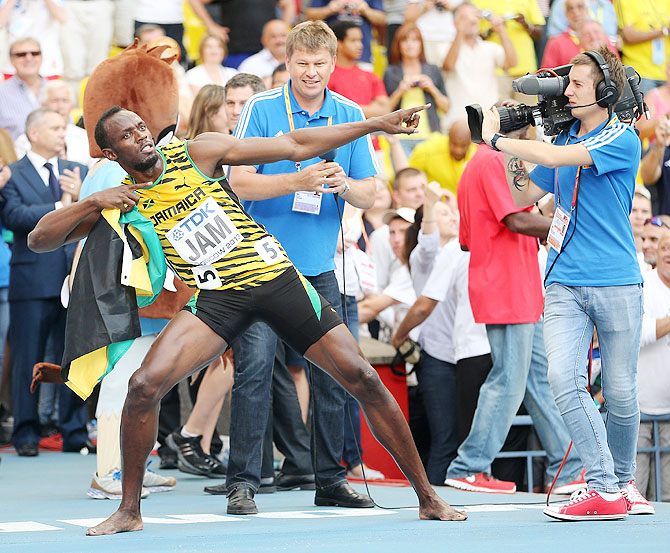
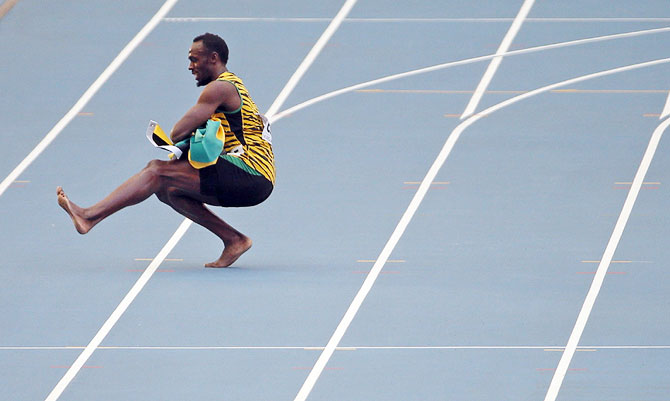
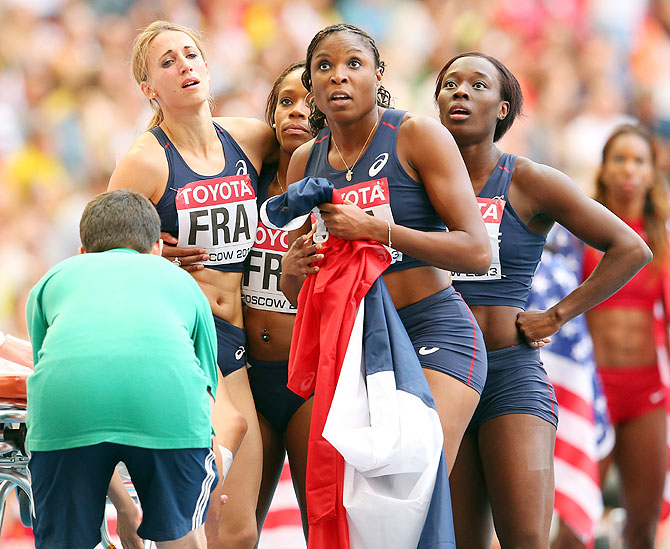
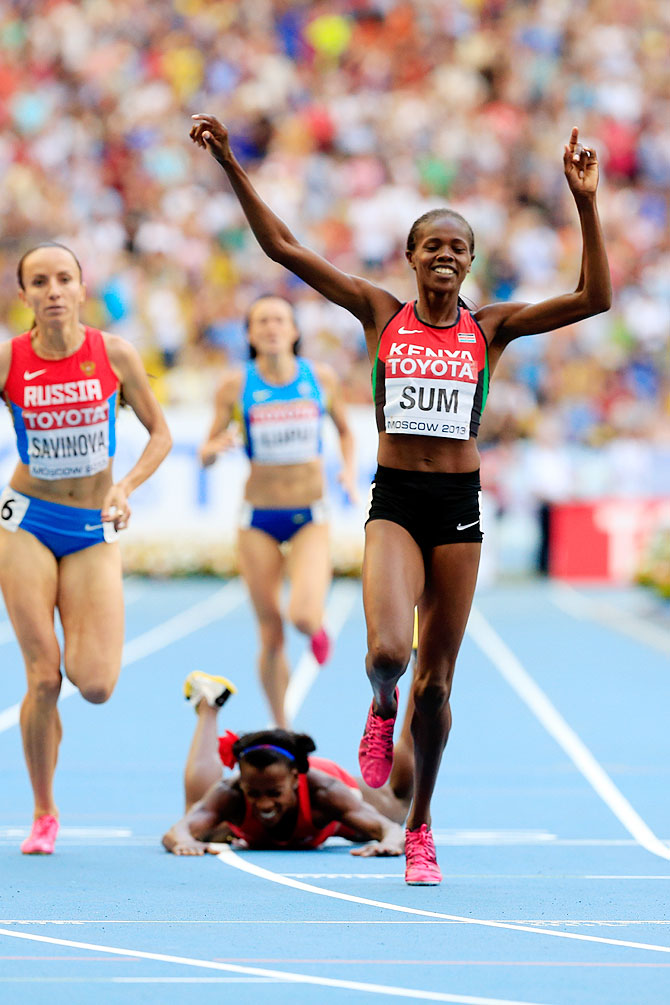
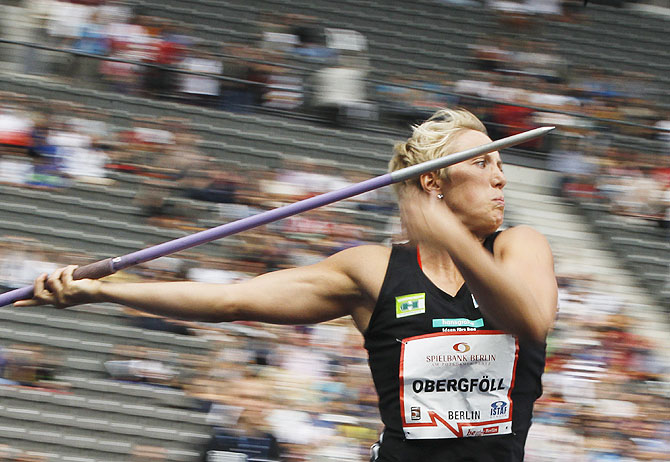

Comment
article